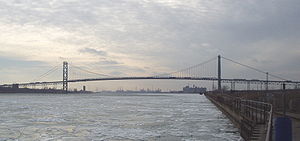Prior to 9/11, Canadians traveled on either their driver's license or a birth certificate. For naturalized Canadians an small pocket size birth certificate fit the bill, but often a driver's license would suffice. Although all 19 of the 9/11 terrorists were in the United States legally and not one of them had entered the US from Canada, the tightening of the border became restrictive to the point that it impedes free passage of goods and tourist traffic. Long line ups at the major border crossings, especially at the Ambassador bridge, have become common.
The Peace Arch, which is situated on the Canada - US Border between Blaine, Washington and Surrey, British Columbia, describes what the Canada - US relationship should be very well. After all both countries have many things in common.
The Peace Arch has the flags of the U.S. and Canada mounted on its crown, and two inscriptions on both sides of its frieze. The inscription on the U.S. side of the Peace Arch reads "Children of a common mother", and the words on the Canadian side read "Brethren dwelling together in unity". Within the arch, each side has an iron gate hinged on either side of the border with an inscription above reading "May these gates never be closed". Source Wikepedia
It started with passport requirements for air travel and then a year later passports were also required for land travel. The Obama Administration has recently introduced a $5.50 levy for air travelers entering the US from Canada. While this seems like a minor amount, it all adds up, when you consider the additional taxes, baggage fees, etc, already applied by carriers.
A recent report "New report shows racial profiling at New York-Canada border" should give us food for thought about what is going on between neighbours. While there is a terrorist threat, intelligence on this activity has seen unprecedented co-operation between the US and Canada. While one can not be definite that no one has ever entered the US illegally with the aim of doing harm to US citizens, most known terrorists have been apprehended at the border. These were stopped with tips from Canada's intelligence Service (CSIS), the Royal Canadian Mounted Police (RCMP) or the Canadian Border and Customs Service. For the most part the system and joint intelligence works.
"This new data demonstrates clearly what we've seen all across the northern border — Border Patrol is more interested in arrest rates and scare tactics than in effective law enforcement," said Nadia Tonova, director of the National Network for Arab American Communities at ACCESS. "Targeting individuals based on race is unacceptable and ineffective. In America, you shouldn't have to fear interrogation by a government agent just because of the way you look."
Despite their declared purpose of protecting the Canadian border, 73% of those detained were from Latin America. 89% of those arrested by Border Patrol were reported as of "medium," "dark" or "black" complexion. Source Conyers In the House
While most of the attention is paid to the Mexican border, it becomes readily apparent that some attention should be paid to what happens in the north. Canadians are not migrating en masse to the United States for a better life.
Canadians, for the most part, are happy with their country. Many engage in cross border shopping, which benefits border business in the US. We have an integrated auto industry with the US, governed by the Autopac. Our cattle industry is integrated, despite the noise of the "Mad Cow Disease", which prevented shipping of Canadian cattle south of the border.
It's time to take a closer look on how we deal with each other on the border and do everything possible to ease travel restrictions. While Europe all but removed its borders, we are tightening them. Good intelligence sharing and cooperation among agencies from both north and south of the border will go a long way. PLEASE STOP THE RACIAL PROFILING, we are not police states.

No comments:
Post a Comment